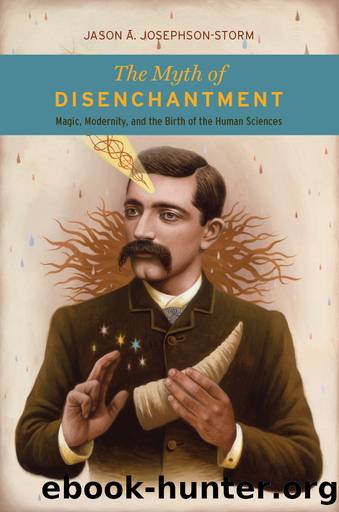The Myth of Disenchantment by Jason A. Josephson-Storm

Author:Jason A. Josephson-Storm [Josephson-Storm, Jason Ā.]
Language: eng
Format: epub
ISBN: 978-0-226-40353-3
Publisher: The University of Chicago Press
Published: 2017-04-18T00:00:00+00:00
MAGICAL PHILOSOPHY AND DISENCHANTMENT: LUDWIG KLAGES
The philosophy of the academy is mechanistic theory, and their practice is mechanical. Magical philosophy rejects the [Aristotelian] law of identity [in favor of flux]; hence it denies unity, objects, duration, recurrence, and mathematics; it denies concepts and causality, because causality is the functional parallel to the logical correlation.
LUDWIG KLAGES, Rhythmen und Runen, 1944
The best way to introduce Ludwig Klagesâs magical philosophy is to paint a recognizable pastiche figure so we have something to compare it to. If we threw everything we teach in American âcontinental philosophyâ or âtheoryâ courses into a blender, what would it look like? Put differently, I think if one were to assemble a Franco-Frankfurt-Frankensteinâs monster out of oft-taught fragments from German critical theory, French poststructuralism, a dash of feminism, and more than a hint of Heidegger, it might have the following qualities.
Despite writing philosophy, our monster would be resolutely antiphilosophy and especially antimetaphysics.23 It would position itself as a critic of modernity, instrumental rationality, and enlightenment.24 It would challenge the value of the binary opposition between civilized and primitive.25 Our monster would argue that the myth of âprogressâ is rooted in âthe domination of natureâ;26 that science and technology are nothing less than an abuse of the natural world, an attempt to render it lifeless in order to extract energy that can be exploited to further human goals.27
It would accuse us of holding on to an absurd faith in technology while nature has lost its mystery, becoming âdisenchantedâ and âreified.â28 In compensation for our alienation from the natural world, it would suggest, we have seen the rise of a meaningless cult of reason that despite its criticisms of fantasy and myth, has replaced the old myths with new cults.29 Our monster would characterize this process in terms of the privileging of the logos and instrumental or calculable reason, for which it would coin the term âlogocentrism.â30
The Franco-Frankfurt-Frankensteinâs monster would also observe that this same process of rationalization has been connected to the rise of the patriarchy.31 That logocentrism has been rooted in the domination of men over women and the suppression of feminine ways of knowing and being.32 That modern heteronormative sexuality is fragmented into artificially rigid heterosexual norms and embodies a distorted form of the universality of human love and desire.33 It would argue that the contemporary world is fundamentally opposed to the natural flows of desire.34 To round out the picture, our monster would be harshly critical of Hegelâs Geist and would draw on Nietzsche as its progenitor, while at the same time distancing its project from Nietzscheâs âwill to power.â35 To these claims, it would add a criticism of the globalization of the modes of American capitalism (or we might say today, neoliberalism) and draw our attention to the violence of colonization.36 Ultimately, in opposition to logocentrism, the monster would remind us of the importance of the body.37 It would emphasize the primacy of writing, and call for a renewal of our connection to a vitalized nature and the unleashing of the productive force of an orgasmic or unbounded desire.
Download
This site does not store any files on its server. We only index and link to content provided by other sites. Please contact the content providers to delete copyright contents if any and email us, we'll remove relevant links or contents immediately.
Getting It, Then Getting Along by L. Reynolds Andiric(650)
Religion and Politics Beyond the Culture Wars : New Directions in a Divided America by Darren Dochuk(558)
Global Justice, Christology and Christian Ethics by Lisa Sowle Cahill(428)
Positive Psychology in Christian Perspective: Foundations, Concepts, and Applications by Charles Hackney(353)
Forgiveness and Christian Ethics by Unknown(342)
Douglas Hamp The First Six Days by Unknown(291)
The Horrors and Absurdities of Religion by Arthur Schopenhauer(268)
Insurgency, Counter-insurgency and Policing in Centre-West Mexico, 1926-1929 by Mark Lawrence(255)
Middle Eastern Minorities: The Impact of the Arab Spring by Ibrahim Zabad(245)
Christian Martyrdom and Christian Violence by Matthew D. Lundberg;(240)
Beyond Heaven and Earth by Gabriel Levy(231)
God and Eros by Patterson Colin;Sweeney Conor;(229)
The Oxford Handbook of Greek and Roman Mythography by R. Scott Smith;Stephen M. Trzaskoma;(228)
The Bloomsbury Reader in Christian-Muslim Relations, 600-1500 by David Thomas;(223)
Autobiography, Volume 2: 1937-1960, Exile's Odyssey by Mircea Eliade(215)
Witches: the history of a persecution by Nigel Cawthorne(211)
Cult Trip by Anke Richter(208)
An Introduction to Kierkegaard by Peter Vardy(197)
The Myth of Disenchantment by Jason A. Josephson-Storm(189)
